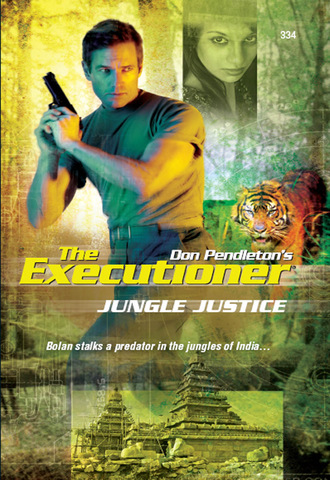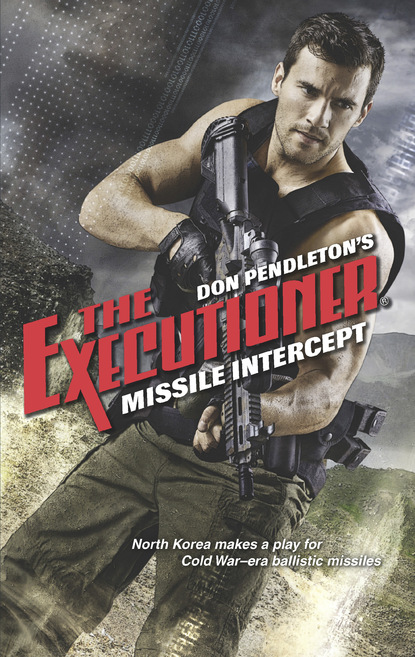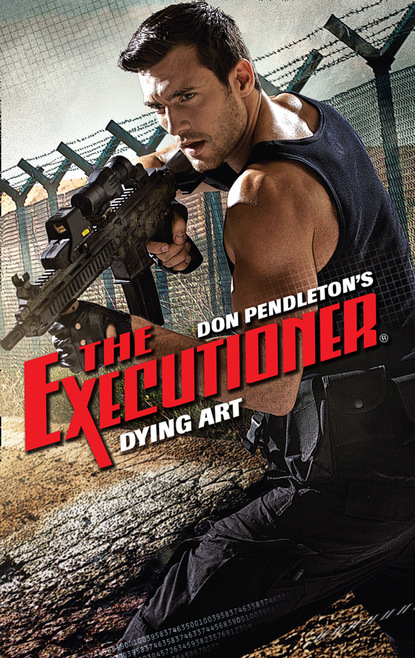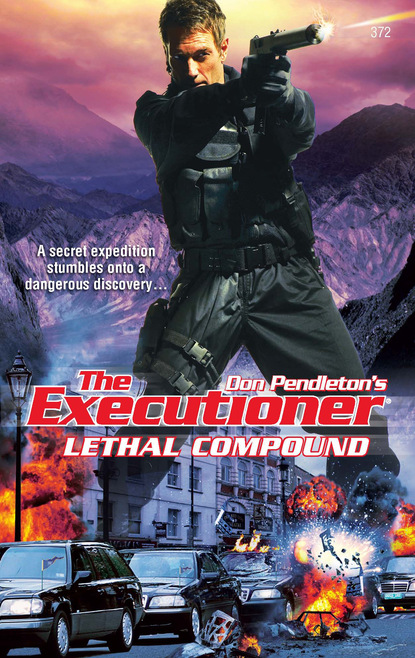
Полная версия
Jungle Justice

Bolan dropped his man with a single bullet to the chest
If it was blood they wanted, the Executioner was ready to provide it. He would teach his enemies a lesson about taking victory for granted. Even if they killed him, survivors of the skirmish would remember, and perhaps take something with them from the carnage when they fled.
He hadn’t meant for this to happen, but the choice was made. His foes had called the play, but they would not control the game.
Bolan lined up his weapon on the trail and listened to the hunters, careless in their haste. That racket was another costly error. The only question, now, was whether any of the trackers would survive to learn from their mistakes.
Or whether Bolan would survive to see another day.
MACK BOLAN®
The Executioner
#259 Nightfire
#260 Dayhunt
#261 Dawnkill
#262 Trigger Point
#263 Skysniper
#264 Iron Fist
#265 Freedom Force
#266 Ultimate Price
#267 Invisible Invader
#268 Shattered Trust
#269 Shifting Shadows
#270 Judgment Day
#271 Cyberhunt
#272 Stealth Striker
#273 UForce
#274 Rogue Target
#275 Crossed Borders
#276 Leviathan
#277 Dirty Mission
#278 Triple Reverse
#279 Fire Wind
#280 Fear Rally
#281 Blood Stone
#282 Jungle Conflict
#283 Ring of Retaliation
#284 Devil’s Army
#285 Final Strike
#286 Armageddon Exit
#287 Rogue Warrior
#288 Arctic Blast
#289 Vendetta Force
#290 Pursued
#291 Blood Trade
#292 Savage Game
#293 Death Merchants
#294 Scorpion Rising
#295 Hostile Alliance
#296 Nuclear Game
#297 Deadly Pursuit
#298 Final Play
#299 Dangerous Encounter
#300 Warrior’s Requiem
#301 Blast Radius
#302 Shadow Search
#303 Sea of Terror
#304 Soviet Specter
#305 Point Position
#306 Mercy Mission
#307 Hard Pursuit
#308 Into the Fire
#309 Flames of Fury
#310 Killing Heat
#311 Night of the Knives
#312 Death Gamble
#313 Lockdown
#314 Lethal Payload
#315 Agent of Peril
#316 Poison Justice
#317 Hour of Judgment
#318 Code of Resistance
#319 Entry Point
#320 Exit Code
#321 Suicide Highway
#322 Time Bomb
#323 Soft Target
#324 Terminal Zone
#325 Edge of Hell
#326 Blood Tide
#327 Serpent’s Lair
#328 Triangle of Terror
#329 Hostile Crossing
#330 Dual Action
#331 Assault Force
#332 Slaughter House
#333 Aftershock
#334 Jungle Justice
The Executioner®
Jungle Justice
Don Pendleton

There is no forgiveness in nature.
—Ugo Betti, 1892–1953
Crime on Goat Island
Nature takes care of her own, but we sometimes can’t afford to wait. This time, I’m helping to level the scales.
—Mack Bolan
For the Linkup, fighting for justice one step at a time.
Contents
Prologue
Chapter 1
Chapter 2
Chapter 3
Chapter 4
Chapter 5
Chapter 6
Chapter 7
Chapter 8
Chapter 9
Chapter 10
Chapter 11
Chapter 12
Chapter 13
Chapter 14
Chapter 15
Chapter 16
Chapter 17
Chapter 18
Chapter 19
Chapter 20
Chapter 21
Chapter 22
Chapter 23
Chapter 24
Chapter 25
Chapter 26
Epilogue
Prologue
Sundarbans Wildlife Park, India
“I’m still not clear exactly why we need an army escort in a game preserve,” Phillip Langley said.
His guide, a thirty-something diplomat named Rajit Singh, concealed any frustration that he may have felt concerning Langley’s poor retention. Smiling, he replied, “All wildlife is protected in the Sundarbans, and most particularly tigers, sir. Of course, the law is one thing, and reality is something else entirely, as I’m sure you know.”
Joyce Langley spoke up from the seat beside her husband, swaying with the rocking motion of their boat as it moved ever deeper into the world’s largest mangrove swamp. “You mean that poachers hunt the tigers, even here?” she asked.
“Most certainly, memsahib,” the guide replied. “And here most cunningly of all.”
Stomach uneasy, Phillip Langley asked, “When do we go ashore?”
“Not long, sir,” Singh assured him. “Fifteen minutes, maybe less.”
The heat was even more oppressive here than in Calcutta, where Langley and his wife had spent the previous night in what passed for a four-star hotel, after meeting their guide at the local seat of government. Langley’s role as special U.S. envoy and a member of the President’s task force on preservation of endangered species had assured Langley the best room in the house—which wasn’t saying much.
At least, he reassured himself, it was a far cry from the teeming, reeking slums they’d seen while driving from the airport to their rendezvous with Rajit Singh. Langley was clueless as to how people survived in squalor so profound and hopeless. Given half a chance, he would’ve filmed Calcutta in 3-D, bottled its smell and shared the grim experience with everyone who ranted about poverty in the United States.
Compared to the worst of Calcutta, the South Bronx and Cabrini Green looked like a juicy slice of Beverly Hills, 90210. Langley wasn’t sure that any of the people he’d seen lying in the streets and gutters had been dead, but on the other hand, living in such conditions made the prospect of a coronary sound like sweet relief.
Now, here they were, sweating beneath a broiling sun, the humidity close to one hundred percent, and his industrial-strength bug repellent was barely holding the king-sized mosquitoes at bay. They’d seen some birds that Langley didn’t recognize, and several crocodiles that eyed him as if he was a prospective snack.
Even with the rocking of the boat, Langley had almost soured on the plan to go ashore. Ideally, he’d have ordered Singh to turn the boat around and take them back to the Port Canning railhead, but how would that look in his final report?
Stiff upper lip, he thought, wiping the perspiration from it with his sleeve.
“I understand most of the tigers in the Sundarbans are man-eaters,” his wife was saying, using all of her considerable charm on Rajit Singh.
“You are correct, memsahib,” the guide replied. “That is another reason for the military guard, you know. Because prey in the game preserve is scarce, and humans run so slowly, most of the three hundred Bengal tigers here have eaten men. We record an average twenty-six maulings per year, most of them fishermen and woodcutters.”
“And still, you work to save the tigers?”
“But of course. It is the law.” Raising an arm to point, Singh told them, “There, ahead, you see the dock where we will land.”
Langley could see the dock, all right, but he felt less secure than ever about stepping from the boat. Twenty-six tiger kills in a year meant one every two weeks. When had the last one been, he wondered. Was it time to log a fresh statistic on the butcher’s bill?
The boat was veering toward the dock on his left. Langley knew he was running out of time. “About these tigers, Mr. Singh,” he said. “What happens if we meet one on our tour? I mean, if we meet a hungry one.”
Singh smiled at that, just short of mocking him. “Fear not, sir. We have the pistols without bullets—oh, what do you call them?”
“Starter pistols?”
“Yes! We have the starter pistols and electric prods. Is very safe.”
“But we have rifles, too,” Langley reminded him, eyeing their uniformed escort.
“Rifles are only for the poachers and the bandits, sir.” Singh’s tone was solemn now. “We shoot a tiger only as the very last resort, sir, in a most extreme emergency. And even then, I fear my job is forfeit.”
“Still,” Langley insisted, “in a real emergency—”
“Have no fear, sir.” The guide had found his smile. “I have not lost a Western diplomat so far.”
“So far?”
“Joking! We have the laugh together, yes?”
Hilarious, Langley thought, as he forced a smile. Joyce poked him in the ribs, a subtle elbow shot, and he managed to say, “That’s quite a wit you’ve got there, Mr. Singh.”
The guide beamed at him. “Everyone is telling me the same, sir. If I was not in the government employ, I should be a comedian.”
“Something to think about,” Langley replied. In case a tiger eats my ass.
The boat nosed in against the dock, where some native youths stood waiting to secure the lines. More soldiers also stood by, rifles slung or tucked beneath their arms, guarding a pair of Land Rovers.
“There are no highways in the Sundarbans,” Singh told them, when they stood once more on semisolid ground, “and few passable roads. To really see the game preserve, a person must walk or travel on the waterways, but I believe you would prefer to ride.”
You got that right, Langley thought. If I have to be among man-eating tigers, lock me in a sturdy SUV.
“That’s very thoughtful of you,” Joyce said.
“Sadly, the Rovers have no air-conditioning,” Singh said, “but we shall roll the windows down. Only a few tigers jump through the windows of a moving vehicle.” He let them soak that in, then said, “I joke again!”
“Better and better,” Langley said. “About those gangs you mentioned—”
“Mostly poachers,” Singh replied. “Mostly a group led by the pig Naraka. My apologies, memsahib.”
“Naraka?” Langley asked.
“A bad man. Very bad. But have no fear, sir. I believe we shall not meet with him today.”
1
Calcutta
Calcutta was a shock to any first-time Western visitor.
It was the second-most populous city in an overcrowded nation where more than thirteen million people shared barely eight hundred square miles.
Over the past two centuries, the city had been purged by floods, famine, riots and war. The British influence remained—English predominated on street signs and in public conversation—but the constitution also recognized fifteen other tongues. Great religions rubbed shoulders in the crowded streets, but the ancient image of death goddess Kali was never far removed, her six arms reaching out for skulls and human sacrifice.
Above all, there was poverty. Calcutta’s slums dwarfed those of Bangkok, Jakarta, Rangoon or Kuala Lumpur. Millions roamed and slept on filthy streets, dressed in rags and infected with loathsome diseases, living hand-to-mouth as thieves or beggars. Others sold themselves, either for sex or literally, piece by piece, to blood and organ vendors representing wealthy clients. What did a cornea or kidney matter, when the final stakes were life or death?
Mack Bolan had passed through Asian slums before, in half a dozen troubled nations, but Calcutta’s were the worst he had seen. The odors permeated flesh and fabric, defying the purgative powers of soap and shampoo. There was a kind of soul-rot in this place that crept inside the human heart and burrowed deep.
Bolan had flown in early from the States to learn the ground before he met his contact and began the mission proper. Lack of preparation was a fatal flaw in the Executioner’s trade, where each decision had a direct impact on his longevity. He’d managed to survive this far, against long odds, by paying close attention to details.
And he didn’t intend to change that pattern now.
Calcutta had its stylish neighborhoods, department stores and monuments, but none of that concerned him. Bolan’s path lay on the wild side, in the darkness where “respectable” Calcuttans seldom strayed, a part of their immediate surroundings they struggled daily to ignore.
Bolan’s hotel was an outpost on the DMZ between tourist-brochure Calcutta and a blighted district where the “other half” sometimes didn’t survive the night. His first foray across the line, made on the afternoon of his arrival, was a visit to a certain shop on the wrong end of Benjamin Disraeli Street. Ostensibly, the owner was a pawnbroker who earned his living from the misfortune of others, but his secret back room was an arsenal of modern military hardware, open to selected customers by invitation only.
Bolan’s invitation was a roundabout arrangement, courtesy of Hal Brognola at Justice and a colleague with the CIA in Langley, Virginia. A word to the wise, and Bolan was in, sharing the wealth he’d lifted from a Baltimore crack dealer two weeks earlier to purchase certain basics of the soldier’s trade.
His purchases included a Steyr AUG assault rifle, chambered for the same 5.56 mm rounds used in the native INSAS models, but more compact and reliable in adverse conditions. For his side arm, he’d chosen a Glock 17, again taking a weapon chambered for the common 9 mm round used by Indian police and military personnel, but with a reputation for superior performance under rough handling. Spare magazines for both weapons, a shoulder harness for the Glock, plus ammunition and a brand-new K-Bar fighting knife had rounded off his purchase.
He had stashed the AUG and various accessories at his hotel, but wore the Glock when he went out to learn the city’s secrets. Bolan knew, before he set foot on the sidewalk, that a lifetime could be spent trying to understand Calcutta, yet the deepest, darkest secrets would evade him. That was fine, as long as he picked up enough to help him stay alive to complete his mission.
Police patrols, for instance. Bolan marked them, noted where the prowl cars went and where they didn’t, which blocks were ignored and left to fester with no uniforms in sight. He was convinced that several of the sleeping men he passed along his way were dead, in fact, but Bolan didn’t stop to prove the point.
None of his business. He had other work to do.
His contact had arranged a meeting at a curry restaurant, a quarter mile from Bolan’s small hotel. He had studied three approaches to the place, which occupied a busy corner in a kind of low-rent no-man’s land. He could approach his target from the north or south, along Clarke Street, or from the east, by passing through a squalid alleyway perversely labeled London Mews. He recognized the alley as a prime spot for an ambush, but the crowded north-south street was just as bad, if someone cared enough to infiltrate the crowd of passersby or fire from the apartments stacked above street-level shops.
The one thing Bolan absolutely didn’t plan to do that night was to dine on curry in an unfamiliar restaurant. He had a cast-iron stomach, long inured to gagalicious Green Beret cuisine, but still he didn’t want to take the chance. Instead, he ate a midday meal at his hotel and made it last, bolstered by shrink-wrapped snacks and bottled water in the early evening, as daylight waned.
Bolan put on his stern game face and hit the streets with an hour to spare, ample time to reach his destination, scout the neighborhood one last time and be ready when his contact finally arrived. The image of a passport photograph was burned into his memory, a common face, but one he would not forget until the mission was behind him and he had no further need of it.
The sat phone in his pocket was a hot line to the States, with Hal Brognola’s several numbers and Stony Man Farm on speed dial, but none of them would help him here. Bolan was off the screen this evening, well and truly on his own.
ABHAYA TAKERI WAS EARLY for his rendezvous with the American. Unlike the stranger he had come to meet, he had no photographs to work from, not even a physical description of the man who’d traveled halfway around the world to meet him in Calcutta. But he had the magic word.
Saffron.
Someone had thought about it and decided it would be the perfect password for a meeting in a restaurant. Why not? They didn’t pay Takeri to decide such things, only to speak the words that he was given and perform on cue in other ways.
This night, and for the next few days, he would be serving the American as travel guide, interpreter, and general font of knowledge on the ins and outs of life in West Bengal. Beyond that—if he had to fight, for instance—they would have to renegotiate.
Takeri hoped that it would be a simple job, but he already had his doubts. His briefing had included details that suggested travel far afield. He didn’t mind leaving the city—he was a former country boy himself—but there were dangers in the hinterland that made Calcutta’s numbing misery pale by comparison.
He knew tourists imagined India as quaint and scenic, with men in turbans and pith helmets riding elephants around plantations, in the shadow of the Taj Mahal. Landmarks aside, their vision of Takeri’s homeland came primarily from 1940s Hollywood, doubly distorted through a camera’s lens and a kaleidoscope of wishful thinking, harking back to times that never were. The West had lost control of India in 1947, and that stranglehold was never the idyllic life portrayed in films or novels. The common Western view of India was no more accurate than the portrait of American slavery painted in Gone With the Wind.
Before his grandfather’s great-grandfather was born, Takeri’s homeland was invaded, subjugated and exploited for the benefit of merchants and their lackeys, living half a world away. The native culture was suppressed, where it conflicted with the flow of tribute back to London, brutality and wholesale slaughter brought to bear when “insurrectionists” fought back. The history of India was written in her people’s blood, spilled by conquerors who left their imprint on the land, the language, everything he saw and touched from day to day.
Takeri’s nationalism didn’t mark him as a die-hard enemy of the West, however. He recognized that there were troubles enough in his homeland, without blaming anyone outside India’s borders. Gandhi himself had never managed to quell the sectarian bloodshed between Hindus, Sikhs and Muslims that continued to the present day. That three-way war had claimed Indira Gandhi’s life and countless others, since the British tyrants had withdrawn in 1947. It endured still, in clashes over Kashmir, with the Pakistanis, and echoed in the living tragedy of Bangladesh. Too many children still labored in virtual slavery, while untouchables were scorned and persecuted, women slain in honor killings by their jealous husbands or else immolated when their spouses died.
Change for the better was a slow and agonizing process. Abhaya Takeri shared the frustration of his countrymen who wanted better lives without surrendering the best parts of their native culture. He believed such things were possible. And that, in part, was what had opened him to contract offers from the CIA.
He recognized the irony of his complaints against the West, while he collected U.S. dollars for his service to the lords of Washington. Sometimes he woke up in the middle of the night, from troubled dreams, seething with anger at himself and at the nation that had forced him toward a measure of betrayal. In the end, though, when it mattered most, Takeri managed to persuade himself that he was working for a greater good, on behalf of India and all her people.
This time, for example, if his briefing had been accurate, he would assist in cleaning out a nest of bandit scum who had disgraced West Bengal for over a decade. Poaching was only part of it, an outlawed trade that spawned corruption, theft and murder stretching from Calcutta to the Sundarbans.
How many lives had Balahadra Naraka claimed so far? Two hundred? Three hundred or more? Takeri wasn’t sure, and further doubted that precise statistics were important. Various officials in West Bengal had been negligent or worse in dealing with the problem, throwing up their hands and pleading helplessness in the face of Naraka’s savagery. Their failure was a national disgrace, one Abhaya Takeri hoped to remedy.
While waiting for his meet with the American, he’d made inquiries here and there, around Calcutta. Certain merchants knew when contraband was moving, knew the sellers and buyers, their middlemen, the details necessary to unravel a conspiracy. With coaxing, he had managed to unlock their lips, extract their secrets bit by bit. More remained to be exposed, but for the moment, he was satisfied.
If only he could shake the sense of being followed.
There was nothing he could point to with assurance, no familiar face glimpsed time and time again behind him, in a crowd. But still, Takeri knew someone was watching him. He had a special sense about such matters, which had saved his life on more than one occasion. As he approached the curry restaurant, Takeri was alert to any shadows, spotting none.
He could abort the meeting, leave some message with the restaurant’s proprietor for the American to try another place, another time, but that would start them on the wrong foot, make the stranger feel Takeri was incompetent. Perhaps, he told himself, the feeling was just that—a feeling without substance. If he couldn’t see his enemies, Takeri knew there was at least a chance that they did not exist.
He dawdled through the last four blocks, still early for the meeting, killing time at shop windows and shrugging off the beggars who infested Clarke Street. None was quite so forward as to touch Takeri, but they crowded him, pleading for money or anything else he could spare. Takeri ignored them, brushing past them as if they didn’t exist, and felt the worse for it with every step he took.
He felt the beggars studied him and mocked him while he window-shopped and several times reversed directions, hoping by that method to detect a stranger following. Takeri wondered if the poor and starving thought him mad, then finally decided that it made no difference. Their opinion didn’t matter. It was nothing, written on the wind.
A short block from the restaurant, he was almost persuaded that his fears were all in vain. He’d been mistaken. There was no one after him at all. Why should there be?
And then, two men emerged from London Mews, moving to block his path. They were not beggars, and the hands they offered to him were not held palm-up and empty.
Both were clutching knives.
Takeri stopped, began to turn and glimpsed two other men he had somehow missed, closing behind him now. Long blades sprouted from their dark fists.
Cursing himself for carelessness, Takeri realized he was about to die.
2
The Executioner had started to relax at the first glimpse of his contact. The man was taking his time and double-checking to be sure he wasn’t followed. That was something Bolan could appreciate, a conscientious guide to help him through the next few days.
He wouldn’t jump the gun, Bolan decided, wouldn’t try to brace his contact on the sidewalk, when they’d already agreed to meet inside the restaurant. It was a small thing, but he didn’t want to start off breaking rules, changing established orders. It created a bad precedent, and Bolan didn’t want to go there.














